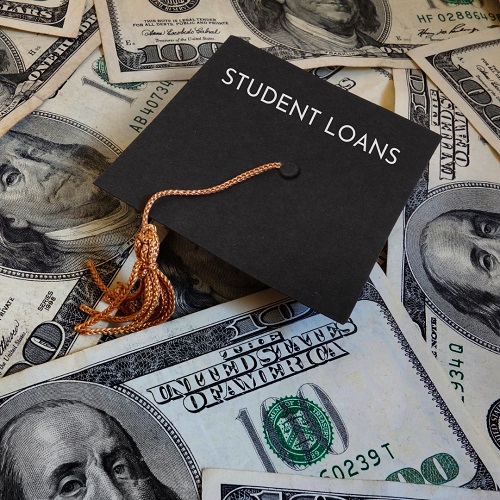Student Loans for International Students

A student loan is a type of loan designed to help students pay for post-secondary education and the associated fees, such as tuition, books and supplies, and living expenses. If you aren’t able to find scholarships or you need some more financial aid to supplement your grant money, student loans are an option for you to pay for your studies in Canada. However, it’s important to get familiar with how student loans work before applying. On this page, we’ll take you through what you need to know about student loans so that you can be a responsible borrower.
Federal Student Loans
The Canada Student Loan Program is a federal option through the Canadian government for international students who need a repayable loan. These loans are primarily available to Canadian citizens, however, some international students with protected status, such as refugees, are eligible. You can check your Canada Student Loan eligibility on the Government of Canada website.
Private Student Loan
While some international students may be eligible for a Canadian federal student loan, the primary loan source for international students is a private lender. A private lender is one that has no ties to the government. Typically, to obtain a private student loan, you must have a cosigner—an individual who will take responsibility for loan repayment in the event that the borrower fails to do so. However, international students who are enrolled at select Canadian institutions could be eligible to apply for student loans without a cosigner. You can view the list of schools in Canada that are approved for loans to find out if you are eligible to apply. This list will also indicate whether a school has been approved for no cosigner loans.
Additionally, to quickly check your loan eligibility, you can use our loan comparison tool on the right. With this tool, you can find out if you are eligible for a student loan in Canada, and compare lender options.
Interest
Interest is a percentage of a loan charged to the borrower by the lender. When discussing student loans, you’ll often hear about the interest rate. The interest rate for federal Canada Student Loans is prime, the same rate as borrowers with the highest credit rating. Student loans from private lenders will very likely have a different interest rate than federal student loans. It’s essential to check what the interest rate is before applying for a student loan. Some loans will have fixed interest rates, and some will have variable interest rates. A fixed interest rate is one that will never change over time, while a variable interest rate is one that is subject to change over time. In general, borrowers tend to prefer fixed interest rates because they can take comfort in knowing that they will never change over the duration of the loan period. However, the advantage to variable interest rates is that they are typically lower than fixed interest rates, making them a good short-term option. If your program is long, you’ll likely want to consider a fixed-rate loan, but if your program is short, you may want to consider variable rate loan options.
<strong>Repayment</strong>
While repayment will vary based on the loan option you choose, for federal Canada Student Loans, there is a 6-month non-repayment period after graduation. This means that you won’t have to start repaying your student loan until 6 months after your graduation date. In Canada, international students may work while in school. Full-time students with a study permit at an eligible institution may work on-campus without a work permit. Additionally, full-time students enrolled in an academic, professional, or vocational program at a designated learning institution may work off campus without a work permit. This will allow you to earn money for student repayment while completing your studies. If you have the money to start repaying your loan before graduation, then we recommend doing so. However, if you aren’t able to repay your student loans right away, deferment is a flexible option. Student loan deferment allows you to postpone the repayment of your student loan and must be agreed upon by the lender. There are many different ways to repay your loan, however, in all cases, a repayment schedule will be provided to you by the lender.
Frequently Asked Questions
Can I apply for a student loan while studying as an international student in Canada?
Yes- protected persons may be eligible to apply for federal Canada Student Loans, however, federal student loans are mostly limited to Canadian citizens. There are private loans available to international students attending universities supported by a private lender.
Are Canadian citizens eligible for these private loans?
Yes! If you’re a citizen of Canada and you want to check your student loan eligibility, you can use our free comparison tool, then apply online.
Will the lender check my credit
They might. While most lenders typically require a credit check, others operate based on the borrower’s potential to repay the balance of the loan in the future.
Do these loans require a co-signer
No cosigner is required, however, if you do have a cosigner, you could be offered a better interest rate.
What is the minimum amount that I need to study in Canada as an international student?
You’ll have to take your degree program and the school you attend into consideration. We can’t give a minimum amount as each institution has different tuition rates. However, we can give you an estimate. As an estimate, $20,000-$30,000 CAD per year for tuition fees plus an additional $15,000 CAD for living expenses and other costs is likely to cover a single student. That may seem like a lot but when you compare it to the cost of studying and living in other popular study destinations, Canada is one of the least expensive. It’s a good idea to meet with your university’s financial aid office to get a more accurate estimate for the total cost of attendance.
What should I use the loan money for
Mostly tuition fees, however, you will also need it to cover other expenses like accommodation and books and school supplies.
<strong>What permission do I need to study in Canada as an international student</strong>?
International students will need to obtain a valid Canada Study Permit. You should reach out to your local Canada embassy to get specific visa details.
How much money in student loans can international students get
The amount you can borrow is up to the lender. As a general rule, you should only take out the total cost of your education plus the cost of living where you’ll study. You should also consider taking out less in loans if you have other sources of financial aid, such as scholarships and grants.
What are the terms of repayment
This will depend on what you and your lender agree upon. Typically, your repayment schedule will start 6-months after your graduation date, and while in school, your payments will likely be zero or reduced.
Is it worth it to take out student loans
We can’t answer that for you. It’s important to take every factor into consideration, including how much scholarship money you have earned and how much financial help you’ll have from parents, guardians, and other people close to you. You’ll also need to consider factors such as interest rates and repayment terms. In general, we say that if you’re sure that you have the means to repay your student loan, it could be totally worth it to take out student loans to have the experience of studying in Canada.



